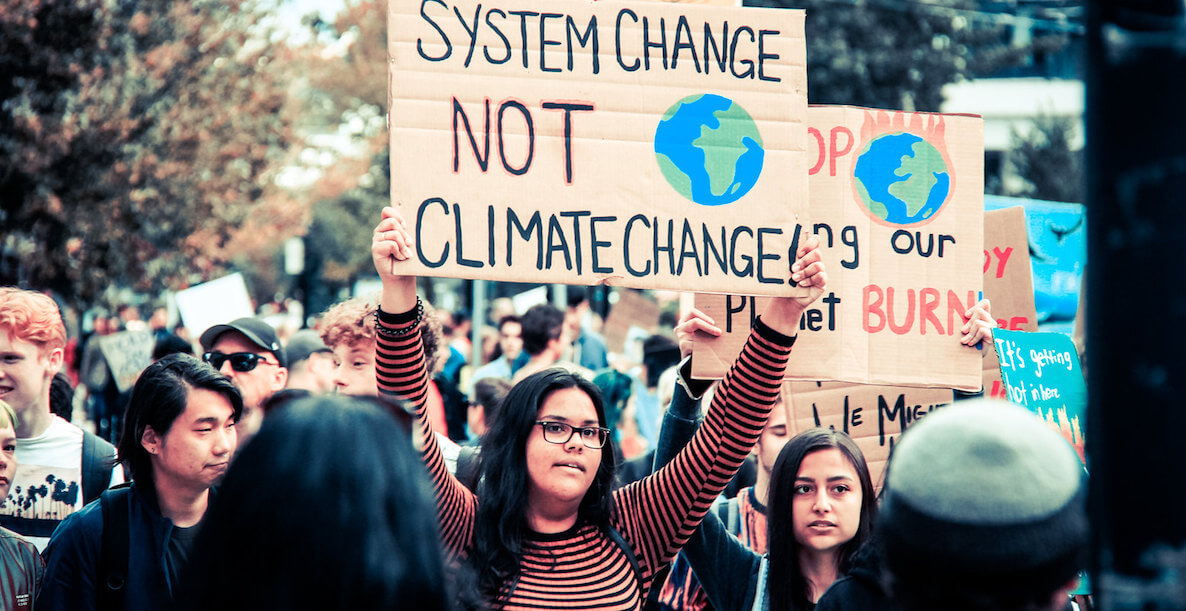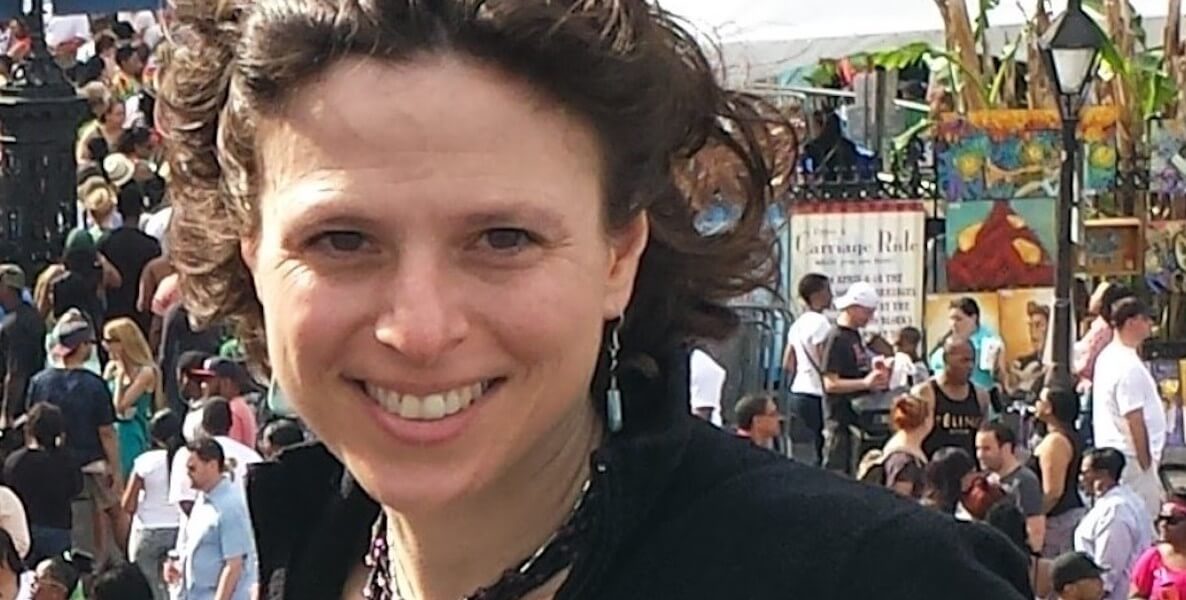The artist community is usually first in line to call attention to those working in silent diligence through a crisis. When Gail Kotel heard about Portraits For Covid Heroes, an art initiative supporting North American frontline workers during the pandemic, her first impulse was to paint her friend working in a Covid-19 hospital unit.
Using a pie-tin take-out container, Kotel painted her friend decked out in her personal protective gear, including her mask and face shield, and sewed bubble wrap over the top of it. “I can’t say, I am gonna go do that there,” Kotel says about where her ideas land. “It just manifests itself, and I follow whatever unique path my brain takes me to.”
MORE ON THE PHILLY FOOD SCENE
Where it took her was her new “Take Out Art Portraits” series, an ongoing art project that promotes supporting local restaurants and calls attention to disposable goods and the environment.
The pandemic took a huge toll on the restaurant industry, which depends on public outings to stay afloat. With the public largely at home ordering in their basic needs as well as takeout food, the pandemic will also leave behind an enormous increase in plastic waste. “Take Out Art Portraits” make conspicuous use of both these realities.
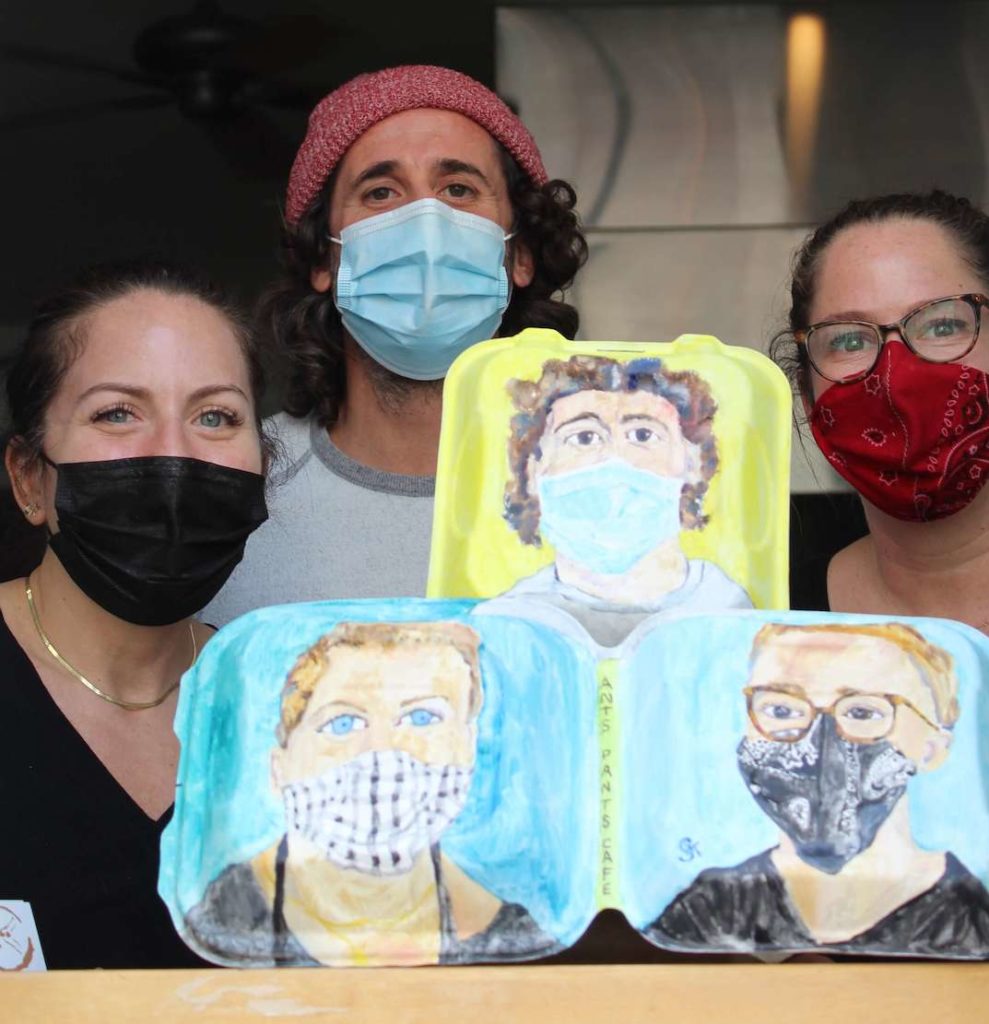
Kotel is a found-object portrait artist who uses discarded materials as the foundation for her paintings. For more than 30 years, her unconventional canvases have been featured in exhibitions and galleries from coast to coast. She is also a health care provider practicing pilates-based physical therapy.
“I feel like my practice is very much outside of the box,” she says of the connection between her art and her work with the human body. “I don’t think that I would be the kind of therapist that I am if I didn’t think like an artist.”
And the “Take Out” series was not conceived all at once, as its genesis existed in Kotel’s portfolio long before Covid.
Developing a skill for found-object art
Kotel began her found-object art career in Italy, where she spent a semester studying while in art school in the early ’90s. Kotel passed a construction site on the route from her apartment to the studio every day. Despite the cat-calling she received, she approached the workmen one day and asked if she could take any leftover construction materials. She came away with a door, which she would transform over the rest of the semester with paint and woodcutting. “I was able to paint—and feel good about painting, as opposed to on the canvas, which felt very limiting.”
Kotel began collecting glass materials from the streets she walked. “As a [native] New Yorker, trash-picking is an art form, and it’s really good stuff that’s out there. Growing up, that’s how you found your furniture.” Using glass bottles led to using windows, using windows led to using frames, and using frames led to bubble wrap.
Her vision in upcycling discarded materials has distinguished her paintings with dimension and texture, making her work unique yet instantly recognizable.
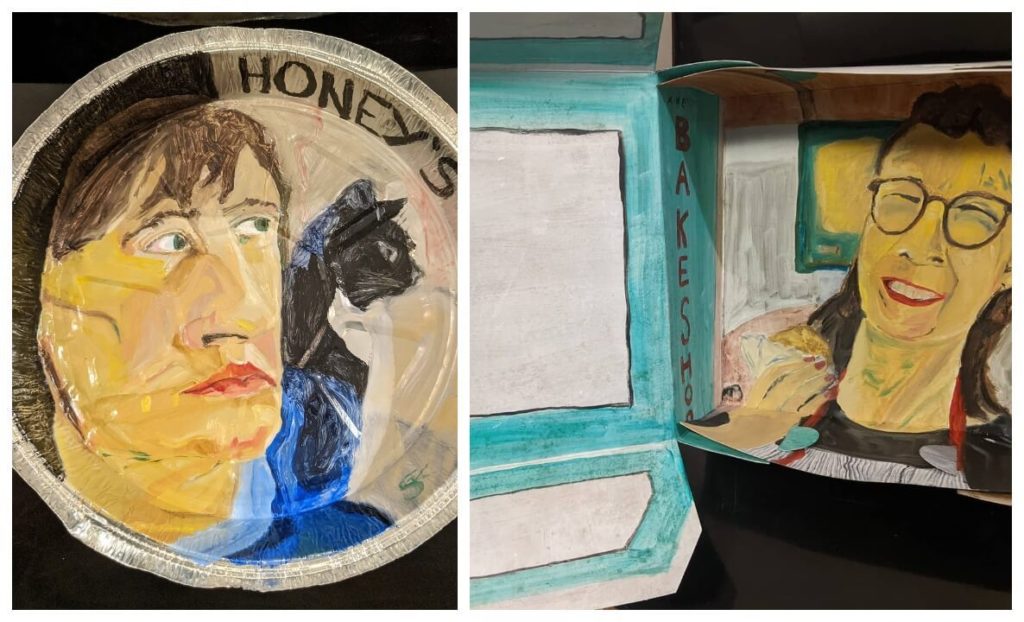
Using art to make an impact in Covid times
Much of the Covid era will be defined by packaging. Quarantines and lockdowns kept all but healthcare and frontline workers at home. Keeping trips to a minimum meant ordering everything online, from clothes and masks to toilet paper and groceries. Kotel bears the responsibility for keeping her patients safe and avoided making public forays wherever she could.
The downside of the safety that comes with ordering everything at home is the amount of waste it generates. According to ocean-focused environmental advocacy group Oceana, e-commerce produces hundreds of millions of pounds of plastic packaging waste per year, much of it just from ordering through Amazon.
Kotel was saving the bubble-wrap mailers many smaller products are shipped in because the waste felt so, in a word, wrong. She began to use them for portraits, mounting them over an object to get a three-dimensional effect.
I feel like the project kind of marries the idea of taking something that we would normally throw away and realizing that it has that staying power; it has art in it. And art has this history and length of time, and also it then gives honor to the people whose restaurant is being affected so much.
Ordering from restaurants, vital to keeping local establishments alive during the long-term restrictions on indoor dining, also has consequences. “My fiancé and I are very big foodies, and now so many of the restaurants that we love are really struggling,” says Kotel. Dozens of restaurants in the Philadelphia area were unable to survive and have closed permanently. Linking her desire to support local businesses while being mindful of the environmental impact, she decided to use those disposable takeout containers to make portraits of the restaurant owners.
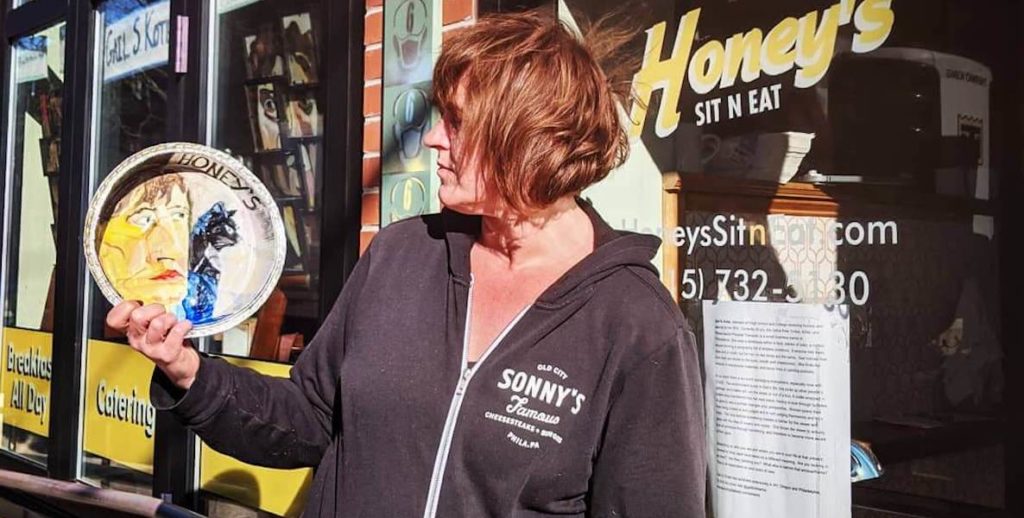
“The project kind of marries the idea of taking something that we would normally throw away and realizing that it has that staying power; it has art in it,” she says. “And art has this history and length of time, and also it then gives honor to the people whose restaurant is being affected so much.”
Where you can find “Take Out” portraits
So far, Kotel has painted “Take Out” portraits for Ants Pants Café, Honey’s Sit ’N Eat, Miles Table, and The Bakeshop on 20th. She is currently working on portraits for Dan Dan and has Las Camaradas on deck. The Honey’s location on South Street features her very first “Take Out” portrait on display in their window. The portrait of the owner of Honey’s is at their Brown Street location. She plans on continuing the series so long as restaurant owners have the need.
“I just think it’s important to recognize that there are people behind all of these places. Not just the people who are serving you—I think people have been really wonderful about giving big tips to the workers in the restaurants. But the people who own restaurants…that restaurant is their artwork. Food is an art form: making food, and creating the look of food, is an art,” she says.
At the intersection of economic hardship and overabundant waste, Kotel’s work is a silent but bold statement depicting the opposing forces of the moment. Visit your local businesses and support your neighborhood’s restaurant owners whenever you can, and make sure to reuse and recycle takeout containers and packaging material at home.
Local restaurateurs are invited to commission their own “Take Out” portrait by contacting Gail Kotel through her website or by calling or texting her at 215-834-9799. You can also see her work at her Instagram page.



